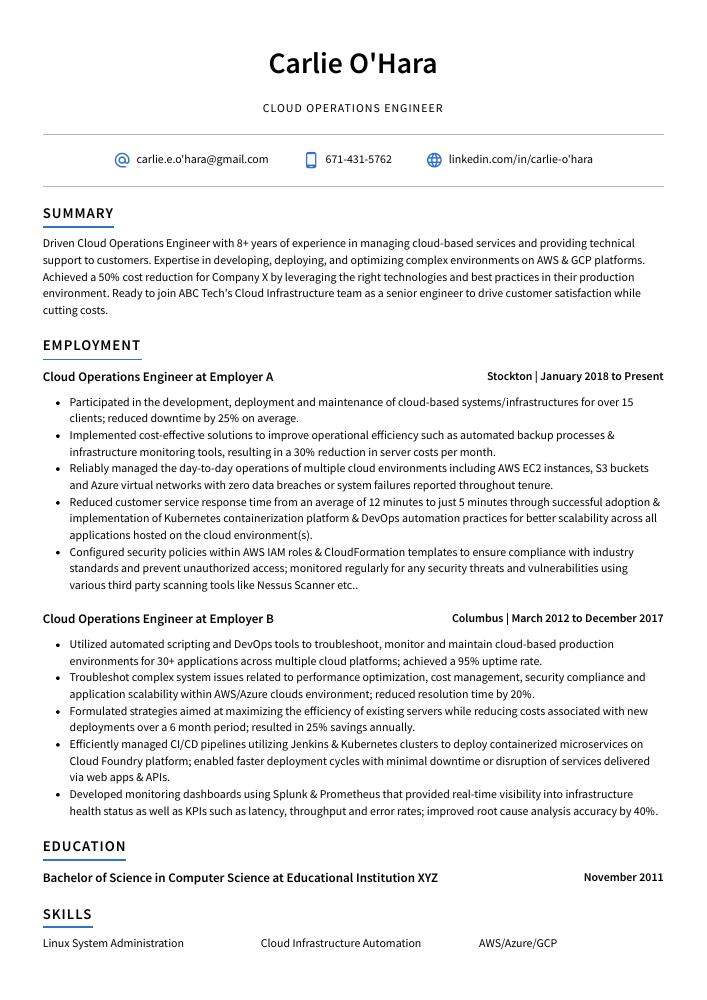Cloud Operations Engineer Resume Guide
Cloud operations engineers are responsible for designing, implementing and maintaining cloud-based systems. They work to ensure the smooth running of applications on a variety of platforms, such as Amazon Web Services (AWS), Microsoft Azure and Google Cloud Platform. Additionally, they manage system security and monitor performance metrics to identify any potential issues or optimization opportunities.
You have the technical expertise to manage cloud operations with ease, but potential employers won’t know that unless you tell them. To get their attention, write a resume that highlights your achievements and demonstrates why you are the ideal candidate for this role.
This guide will walk you through the entire process of creating a top-notch resume. We first show you a complete example and then break down what each resume section should look like.
Table of Contents
The guide is divided into sections for your convenience. You can read it from beginning to end or use the table of contents below to jump to a specific part.
Cloud Operations Engineer Resume Sample
Carlie O’Hara
Cloud Operations Engineer
carlie.e.o’[email protected]
671-431-5762
linkedin.com/in/carlie-o’hara
Summary
Driven Cloud Operations Engineer with 8+ years of experience in managing cloud-based services and providing technical support to customers. Expertise in developing, deploying, and optimizing complex environments on AWS & GCP platforms. Achieved a 50% cost reduction for Company X by leveraging the right technologies and best practices in their production environment. Ready to join ABC Tech’s Cloud Infrastructure team as a senior engineer to drive customer satisfaction while cutting costs.
Experience
Cloud Operations Engineer, Employer A
Stockton, Jan 2018 – Present
- Participated in the development, deployment and maintenance of cloud-based systems/infrastructures for over 15 clients; reduced downtime by 25% on average.
- Implemented cost-effective solutions to improve operational efficiency such as automated backup processes & infrastructure monitoring tools, resulting in a 30% reduction in server costs per month.
- Reliably managed the day-to-day operations of multiple cloud environments including AWS EC2 instances, S3 buckets and Azure virtual networks with zero data breaches or system failures reported throughout tenure.
- Reduced customer service response time from an average of 12 minutes to just 5 minutes through successful adoption & implementation of Kubernetes containerization platform & DevOps automation practices for better scalability across all applications hosted on the cloud environment(s).
- Configured security policies within AWS IAM roles & CloudFormation templates to ensure compliance with industry standards and prevent unauthorized access; monitored regularly for any security threats and vulnerabilities using various third party scanning tools like Nessus Scanner etc..
Cloud Operations Engineer, Employer B
Columbus, Mar 2012 – Dec 2017
- Utilized automated scripting and DevOps tools to troubleshoot, monitor and maintain cloud-based production environments for 30+ applications across multiple cloud platforms; achieved a 95% uptime rate.
- Troubleshot complex system issues related to performance optimization, cost management, security compliance and application scalability within AWS/Azure clouds environment; reduced resolution time by 20%.
- Formulated strategies aimed at maximizing the efficiency of existing servers while reducing costs associated with new deployments over a 6 month period; resulted in 25% savings annually.
- Efficiently managed CI/CD pipelines utilizing Jenkins & Kubernetes clusters to deploy containerized microservices on Cloud Foundry platform; enabled faster deployment cycles with minimal downtime or disruption of services delivered via web apps & APIs.
- Developed monitoring dashboards using Splunk & Prometheus that provided real-time visibility into infrastructure health status as well as KPIs such as latency, throughput and error rates; improved root cause analysis accuracy by 40%.
Skills
- Linux System Administration
- Cloud Infrastructure Automation
- AWS/Azure/GCP
- Networking and Security
- Containerization
- Scripting (Bash, Python, Etc.)
- Monitoring and Logging
- Database Administration
- Cloud Cost Optimization
Education
Bachelor of Science in Computer Science
Educational Institution XYZ
Nov 2011
Certifications
AWS Certified SysOps Administrator – Associate
Amazon Web Services
May 2017
1. Summary / Objective
Your resume summary should provide the employer with a concise overview of your cloud operations engineering experience and skills. Include details such as the number of years you have been working in this field, any certifications or qualifications you possess, and how many successful projects you’ve completed. You could also mention specific technologies that you are familiar with (e.g., AWS, Azure), as well as any achievements or awards related to your work in cloud operations engineering.
Below are some resume summary examples:
Energetic cloud operations engineer with 5+ years of experience in developing, deploying, and managing cloud-based applications. Proficient at designing cost-effective solutions that maximize the value of an organization’s cloud investments. Skilled at troubleshooting system issues to ensure optimal performance and availability. Familiar with multiple technologies such as AWS, GCP, Azure, etc., for a better understanding of customer requirements and expectations.
Determined Cloud Operations Engineer with 6+ years’ experience in the development and maintenance of cloud solutions. Adept at designing, building, and deploying reliable cloud architectures on AWS. Experienced in troubleshooting complex problems related to backend systems while ensuring high availability platforms that meet customer expectations. Proven ability to optimize system performance for maximum efficiency and scalability across multiple environments.
Dependable cloud operations engineer with 5+ years of experience designing, developing, and deploying cloud-based solutions. Experienced in working on AWS environments to provide reliable and secure services for customers. At ABC Company, led the migration from a traditional data center to an agile cloud environment that increased performance by 40%. Proven ability to manage large-scale projects with tight deadlines while delivering customer satisfaction.
Well-rounded cloud operations engineer with 5+ years of experience designing, deploying and maintaining cloud-based solutions. Proven track record providing high availability services utilizing AWS, Azure and Google Cloud Platforms. Successfully implemented a cost optimization plan that reduced infrastructure costs by 25%. Seeking to join ABC as the next cloud operations engineer for their growing tech team.
Passionate cloud operations engineer with 5+ years of experience leading projects in the cloud environment. Experienced in designing, deploying, and managing various AWS services to optimize application performance. Highly skilled at troubleshooting and maintaining cloud infrastructure for optimal uptime. Adept at creating automated processes for scalability, cost optimization, and security compliance.
Professional cloud operations engineer with 5+ years of experience managing cloud-based systems and solving complex problems. Skilled in developing automated processes, optimizing performance, and troubleshooting issues. At ABC Solutions, successfully launched a new system that increased customer satisfaction by 19%. Seeking to use my expertise to help XYZ achieve their operational goals.
Diligent cloud operations engineer with 7+ years of experience managing, monitoring, and optimizing cloud-based systems. Proven ability to improve availability by an average of 20% during deployment projects while cutting costs by 8%. Seeking a new role at ABC Company that will allow me to leverage my expertise in the development and implementation of secure cloud solutions.
Seasoned cloud operations engineer with 8+ years of experience managing large-scale cloud deployments in AWS and Azure. Proven track record of successful migrations, cost optimizations, and incident management for multiple clients. Looking to join ABC Tech to utilize my technical expertise in driving better efficiency across their cloud infrastructure.
2. Experience / Employment
In the experience section, you will want to provide details on your employment history. This should be written in reverse chronological order, meaning the most recent role is listed first.
When writing about what you did for each job, stick to bullet points. Doing so allows the reader to quickly digest what you have said and take in more information at once. You also want to include quantifiable results obtained from any tasks or projects completed during this time period when applicable.
For example, instead of saying “Maintained cloud infrastructure,” you could say, “Monitored and maintained a highly available AWS environment with 99% uptime over an 8-month period.”
To write effective bullet points, begin with a strong verb or adverb. Industry specific verbs to use are:
- Monitored
- Automated
- Configured
- Optimized
- Troubleshot
- Implemented
- Secured
- Managed
- Resolved
- Analyzed
- Upgraded
- Documented
- Tested
- Deployed
- Administered
Other general verbs you can use are:
- Achieved
- Advised
- Assessed
- Compiled
- Coordinated
- Demonstrated
- Developed
- Expedited
- Facilitated
- Formulated
- Improved
- Introduced
- Mentored
- Participated
- Prepared
- Presented
- Reduced
- Reorganized
- Represented
- Revised
- Spearheaded
- Streamlined
- Structured
- Utilized
Below are some example bullet points:
- Secured cloud networks and systems with firewalls, encryption protocols, authentication processes and other security measures to protect data from unauthorized access; reduced security breach incidents by 25%.
- Demonstrated expertise in deploying, monitoring and troubleshooting cloud applications on multiple platforms such as AWS EC2/Lambda, Azure VM/Functions etc.; improved operational efficiency by 30%.
- Structured deployment workflows for software updates that automated the build-and-release process for over 200 cloud services; decreased deployment time per service by 40%.
- Reorganized existing IT infrastructure into a highly available system of multiple availability zones distributed across two regions; increased uptime rates from 95% to 99% within 6 months.
- Resourcefully identified scalability issues under heavy traffic loads during peak hours using performance metrics & log analysis techniques before they occurred; reduced downtime costs by $3000 annually.
- Advised and instructed IT team members on best practices for cloud operations, resulting in a 10% improvement in system performance.
- Compiled and maintained detailed reports of network utilization and costs to optimize infrastructure resources; substantially reduced overall operational expenses by $7,000 monthly.
- Prepared comprehensive technical documentation outlining the deployment process for cloud-based applications within agreed SLAs; improved response times by 25%.
- Substantially increased productivity levels with the introduction of automated tools to schedule server maintenance tasks without manual intervention or interruption of services.
- Introduced backup solutions utilizing AWS S3 buckets and enabled data replication across multiple geographical regions for enhanced disaster recovery capabilities; achieved 99% uptime over 6 months’ period with no service outages reported during that time frame.
- Resolved over 300 incidents related to cloud operations and infrastructure, including application issues, performance issues and system downtime; reduced the mean time to resolution (MTTR) by 25%.
- Competently managed multiple cloud deployments across Amazon Web Services (AWS), Microsoft Azure, Google Cloud Platform (GCP) as well as hybrid clouds with over 500 virtual machines.
- Facilitated seamless migrations of on-premise applications into production environments within AWS/Azure/GCP in a cost-effective manner; generated savings of $10K+ annually for the organization through optimized resource utilization tactics.
- Assessed usage patterns & user feedbacks regularly to ensure optimal end-user experience when accessing web services hosted in the cloud; improved response times by 15% over 3 months period with no additional costs incurred.
- Improved disaster recovery capabilities by designing & implementing automated backup routines that replicated data from production servers onto secondary storage systems located offsite; ensured 100% availability during natural disasters or other unforeseen circumstances without any disruption or data losses occurred.
- Upgraded cloud infrastructure for 50+ clients, with a 90% success rate and $20K in cost savings achieved.
- Revised cloud system architecture to optimize performance and security; reduced latency by 15%, while preventing over 250 cyber threats from infiltrating the systems.
- Coordinated with development teams to ensure that new code was quickly deployed into production environments without compromising existing stability or reliability of services; successful migrations were completed within 5 hours on average.
- Spearheaded the implementation of automated operations processes utilizing DevOps frameworks such as Puppet, Chef & Ansible, resulting in 24/7 uptime assurance across all cloud-hosted networks and applications worldwide throughout 2020–21 financial year period.
- Confidently managed incident response procedures when unexpected outages occurred due to hardware failures or malicious attacks; resolution times decreased by 25%.
- Managed and optimized cloud infrastructure and operations for 500+ customers’ applications, monitoring resource utilization to ensure maximum scalability and cost efficiency; achieved a 20% increase in system performance.
- Tested various software tools to ensure seamless integration with the existing systems while maintaining high levels of security; decreased vulnerability risks by 45%.
- Proficiently utilized AWS services such as EC2, S3, RDS & SQS to develop high-availability solutions that met customer requirements within budget constraints.
- Achieved 100% uptime for critical business applications through proactive maintenance strategies such as patching & configuration management on both Windows and Linux servers environments.
- Documented all processes related to cloud operations including runbooks, incident response plans and best practices guidelines; improved onboarding time from 8 weeks to 4 weeks on average.
- Automated deployment of cloud-based applications and services, resulting in a 25% reduction in deployment times.
- Administered complex network configurations across multiple Cloud environments (Azure & AWS), ensuring highest levels of system availability and performance.
- Monitored real-time usage patterns and trends to identify areas for optimization; identified resource utilization bottlenecks that led to an 11% cost savings on cloud infrastructure costs annually.
- Streamlined processes related to disaster recovery plans, improving data backup efficiency by 40%.
- Thoroughly tested new software releases prior to deploying them into production systems; reduced potential risk exposure from faulty code deployments by 95%.
- Deployed cloud infrastructure for 25+ clients using AWS, Azure and GCP services, ensuring scalability to handle increased workloads.
- Presented cloud architecture designs at weekly meetings with cross-functional teams; streamlined operations by reducing cost of maintenance by 10%.
- Meticulously monitored systems performance metrics such as latency, availability and uptime across multiple cloud environments; proactively identified issues and reduced downtime incidents by 20%.
- Expedited the onboarding process for new customers through automated deployment scripts that enabled speedy provisioning of resources within pre-defined SLA parameters.
- Optimized existing cloud deployments to reduce costs associated with storage & compute utilization while increasing overall efficiency; achieved a 15% reduction in monthly bills over the last quarter alone!
- Analyzed cloud performance data to identify and address any technical issues, resulting in a 20% reduction of system downtime.
- Mentored junior cloud engineers on best practices for deploying new software and services into the production environment with zero disruption; trained 5 team members within 3 months.
- Represented the company at various industry forums & conferences, speaking on topics such as serverless computing & automation tools while engaging potential clients through networking activities.
- Consistently maintained high levels of security compliance across all systems by regularly auditing firewalls, access control rules and application logs; reduced vulnerability risks by 40%.
3. Skills
Even though two organizations are hiring for the same role, the skillset they want an ideal candidate to possess could differ significantly. For instance, one may be on the lookout for an individual with expertise in Amazon Web Services, while another may be looking for someone with experience managing Google Cloud Platform.
It is essential to tailor the skills section of your resume to each job you are applying for because many employers use applicant tracking systems these days. These computer programs scan resumes for certain keywords before passing them on to a human reviewer; therefore, it’s important that you include relevant ones from the job posting here.
Once listed here, you can further elaborate on your skillset by discussing it in more detail elsewhere in your resume – such as the summary or experience sections.
Below is a list of common skills & terms:
- AWS/Azure/GCP
- Cloud Cost Optimization
- Cloud Infrastructure Automation
- Containerization
- Database Administration
- DevOps Practices
- Linux System Administration
- Monitoring and Logging
- Networking and Security
- Scripting (Bash, Python, Etc.)
4. Education
Including an education section on your resume will depend on how far along you are in your career. If you have just graduated and have no work experience, mention your education below the resume objective. However, if you already have significant cloud operations engineering-related experience to showcase throughout the rest of your resume, omitting an education section might be a better option.
If an education section is included in the resume, try to highlight courses taken or subjects studied that are related to cloud operations engineering.
Bachelor of Science in Computer Science
Educational Institution XYZ
Nov 2011
5. Certifications
Certifications are a great way to demonstrate your expertise and knowledge in a certain field. They can be especially beneficial for those who are just starting out their career or looking to make a switch into another industry.
Including certifications on your resume is an excellent way of showing potential employers that you have the necessary skills, qualifications, and experience needed for the job. Be sure to include any relevant certifications that may give you an edge over other applicants!
AWS Certified SysOps Administrator – Associate
Amazon Web Services
May 2017
6. Contact Info
Your name should be the first thing a reader sees when viewing your resume, so ensure its positioning is prominent. Your phone number should be written in the most commonly used format in your country/city/state, and your email address should be professional.
You can also choose to include a link to your LinkedIn profile, personal website, or other online platforms relevant to your industry.
Finally, name your resume file appropriately to help hiring managers; for Carlie O’Hara, this would be Carlie-O’Hara-resume.pdf or Carlie-O’Hara-resume.docx.
7. Cover Letter
Providing a cover letter is an important part of any job application. It is a great way to introduce yourself, express your interest in the role and explain why you are the perfect fit for it.
A cover letter should be concise, usually consisting of 2 to 4 paragraphs that provide additional information about who you are and what you have to offer as a professional. They complement resumes by providing recruiters with more insight into your skillset and personality traits which can help to make sure your resume stands out from other applicants’.
Below is an example cover letter:
Dear Mittie,
I am writing in response to your posting for a Cloud Operations Engineer. With experience managing and automating cloud infrastructure, as well as developing tools to improve efficiency and optimize costs, I am confident I can contribute to the success of your organization.
As someone who is always looking for ways to improve systems and processes, I would be an asset on your team. In my previous role, I was able to reduce server provisioning time by 80% through the use of automation scripts. I also developed a tool that reduced monthly AWS costs by 30%.
My technical skills include:
– Proficient in Python and Bash scripting languages
– Experience with AWS technologies such as EC2, S3, Lambda, and CloudFormation
– Familiar with configuration management tools such as Puppet and Ansible
– Strong understanding of networking concepts such as TCP/IP, DNS, and VPNs
My ability to quickly learn new technologies combined with my strong problem solving skills makes me confident that I can be successful in this role. I look forward to speaking with you about how my skills can benefit your organization. Thank you for your time and consideration.
Sincerely,
Carlie
Cloud Operations Engineer Resume Templates
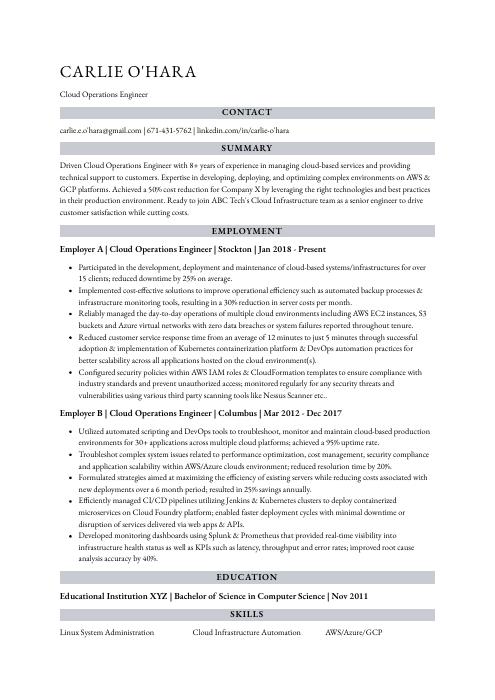 Numbat
Numbat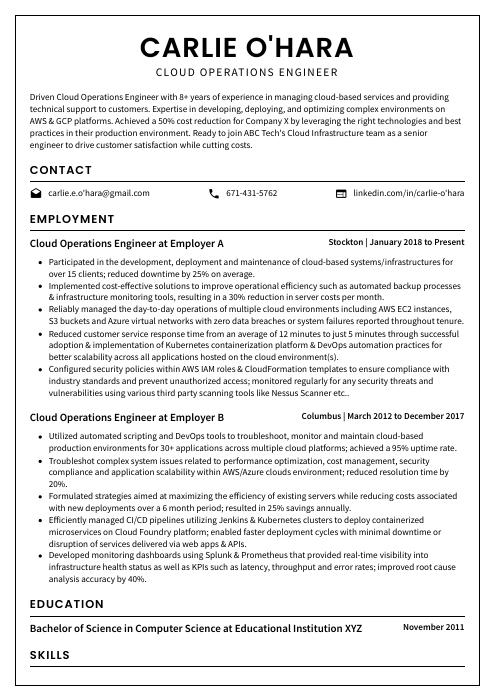 Cormorant
Cormorant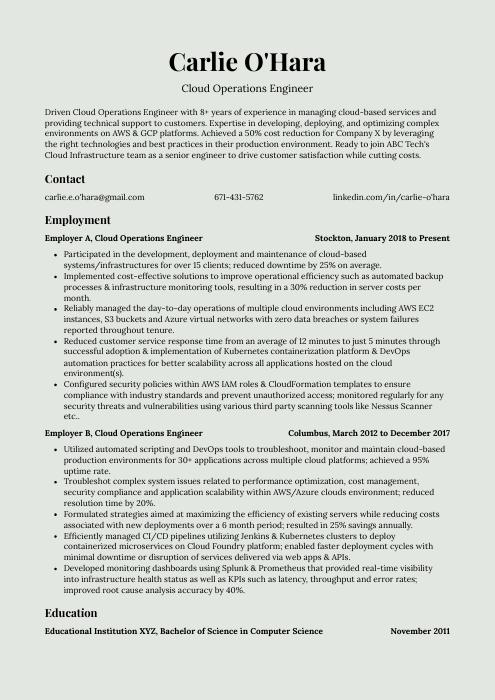 Saola
Saola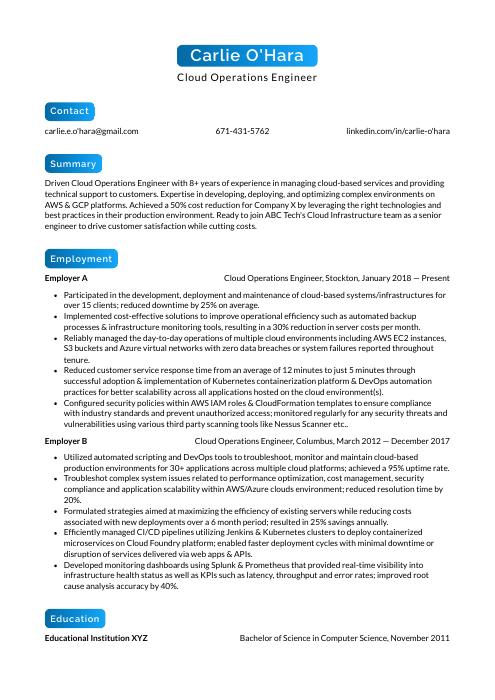 Kinkajou
Kinkajou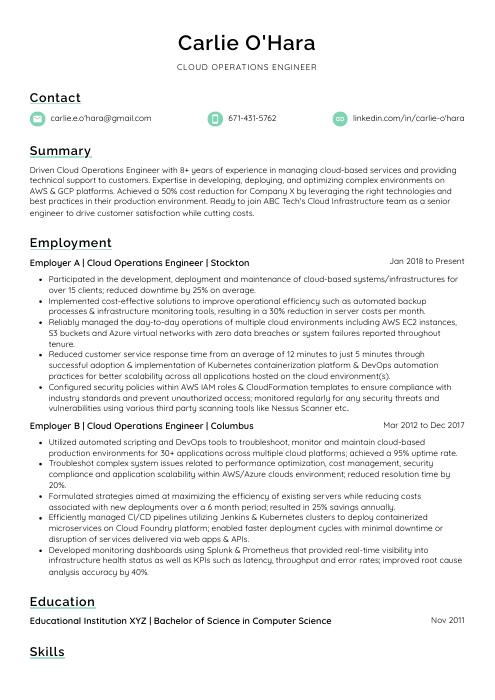 Lorikeet
Lorikeet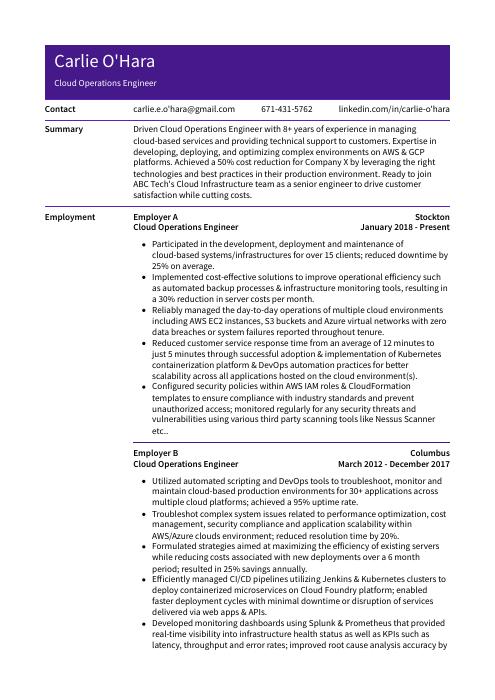 Pika
Pika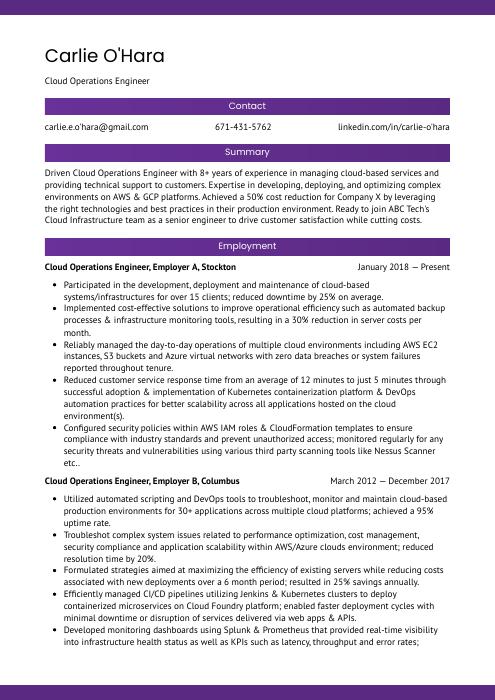 Jerboa
Jerboa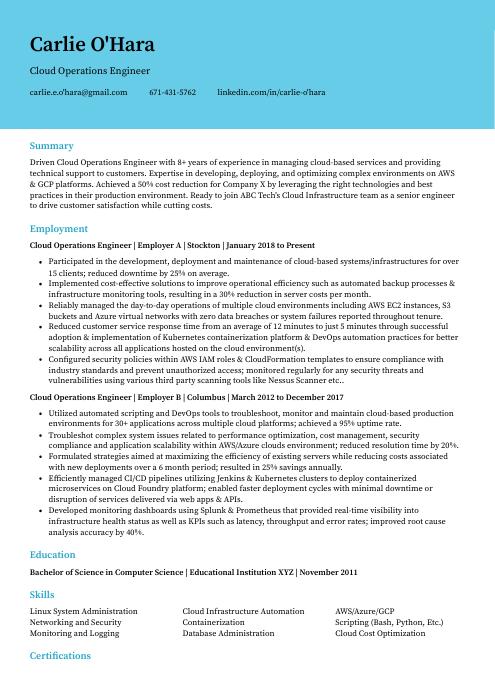 Dugong
Dugong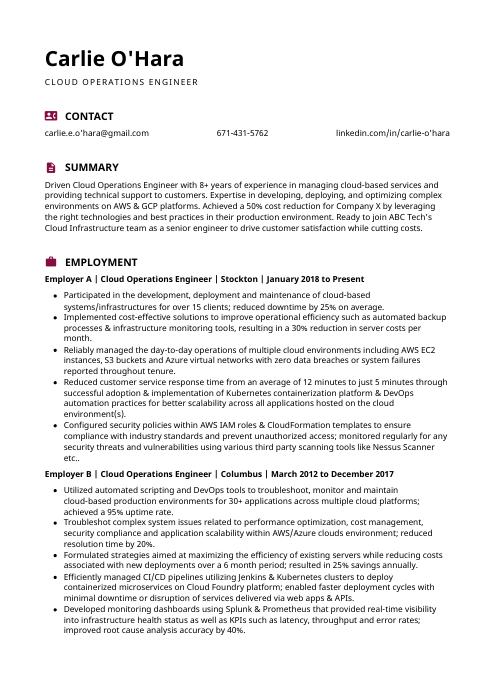 Hoopoe
Hoopoe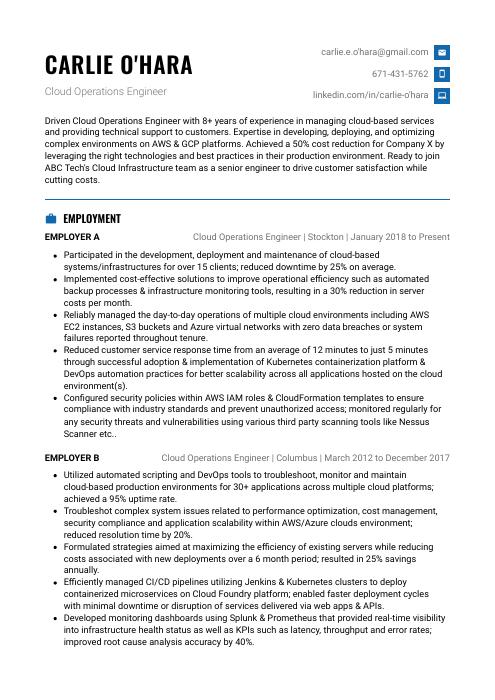 Echidna
Echidna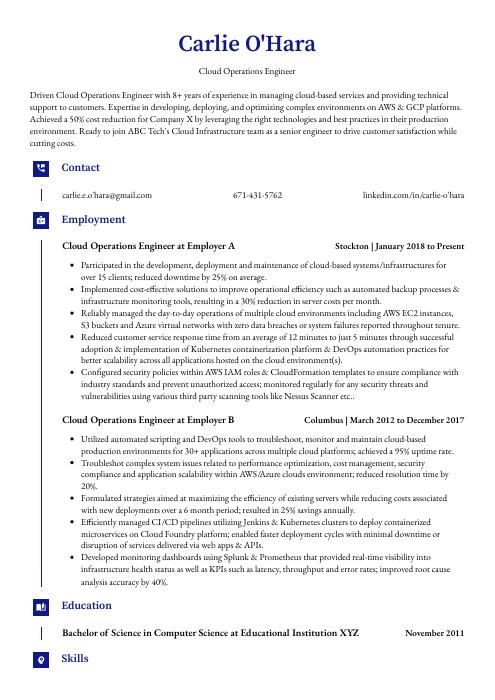 Gharial
Gharial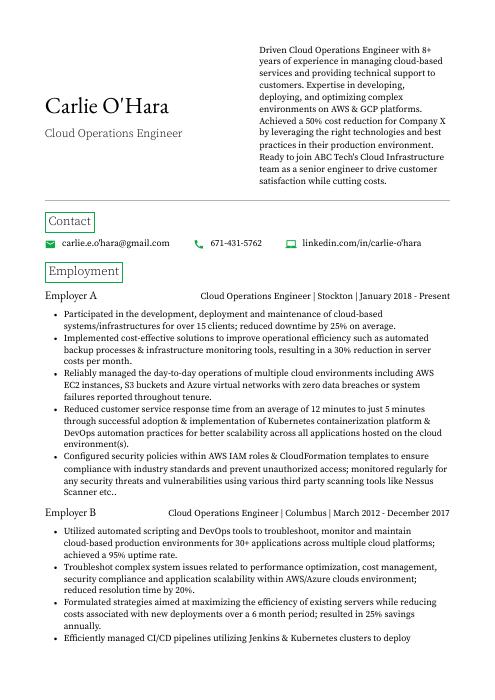 Quokka
Quokka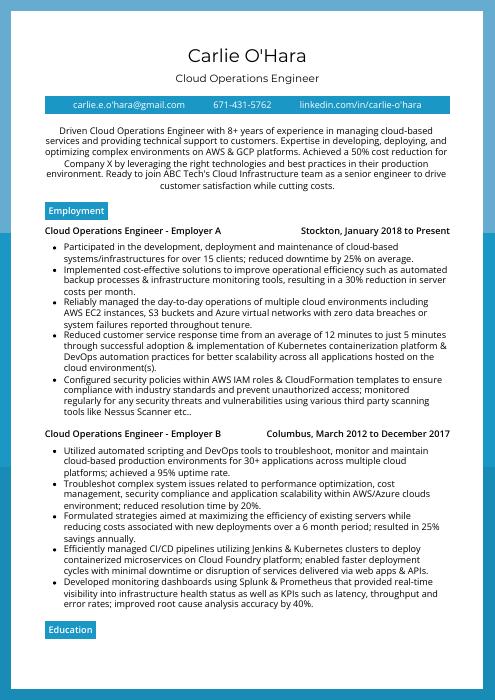 Rhea
Rhea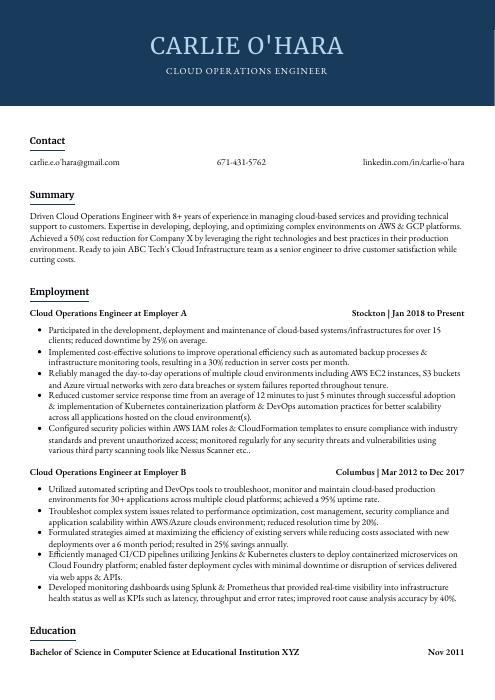 Bonobo
Bonobo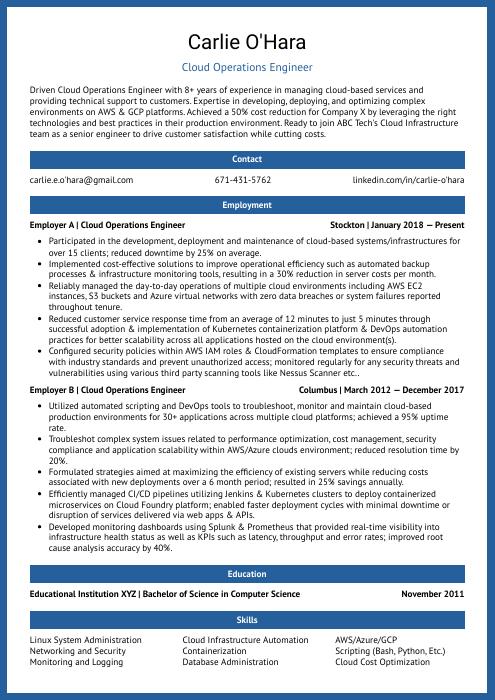 Ocelot
Ocelot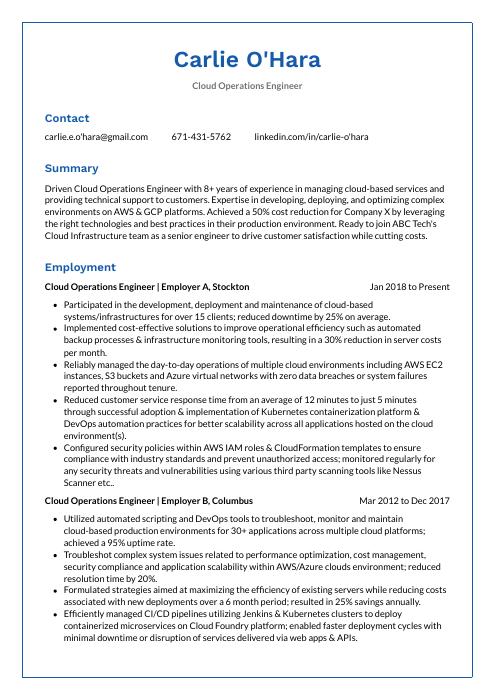 Markhor
Markhor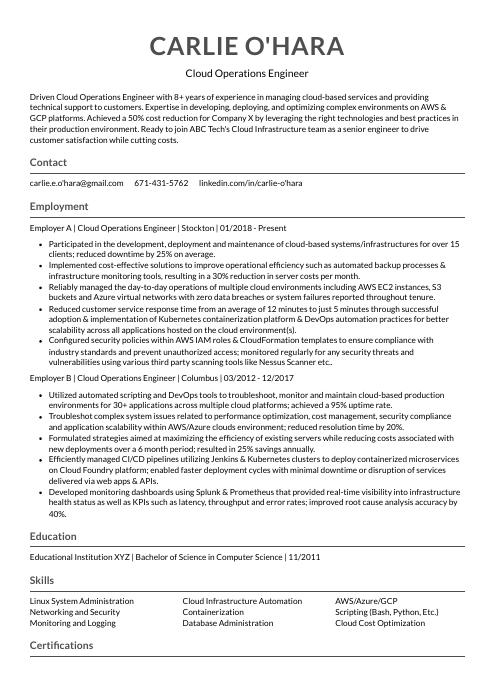 Indri
Indri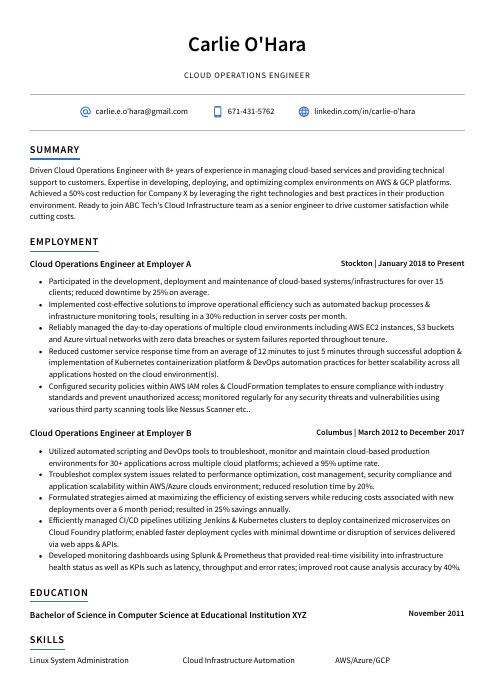 Axolotl
Axolotl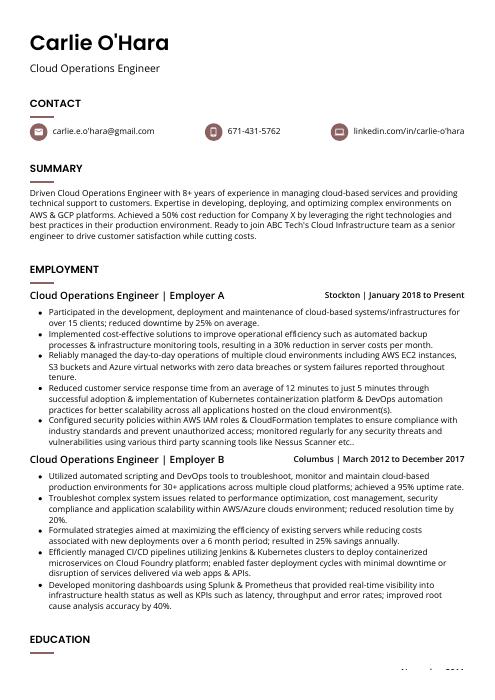 Fossa
Fossa Rezjumei
Rezjumei
